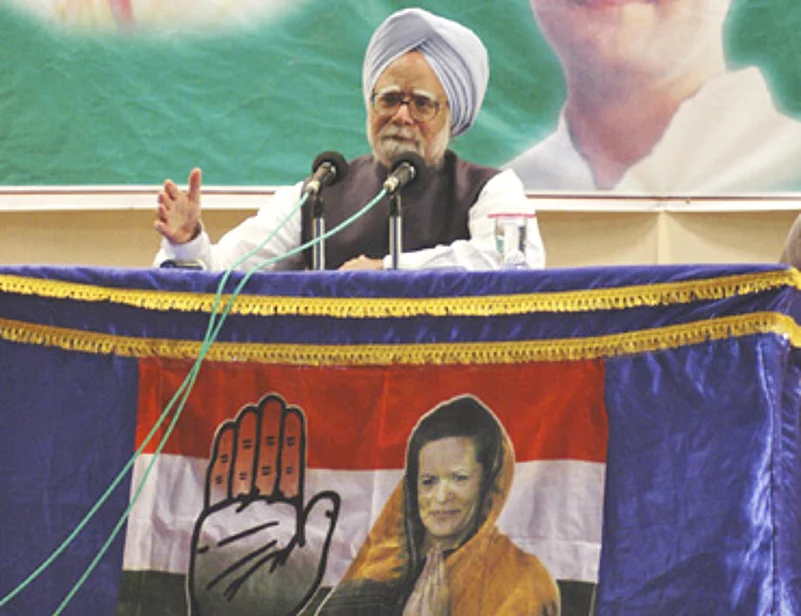"Rehne ko ghar nahin/Saara jahan hamara hai (We don't have a house to live in, but the entire world is ours)."
—a Congress leader summing up the party's current predicament

In fact, what was a murmur earlier is becoming a groundswell now: an increasing number of Congressmen are beginning to say that a system—such as the one that exists in the party today—actively discourages the grooming of new leaders, both because they could be a challenge to the dynasty but, more importantly, because they would diminish the clout of the cabal surrounding Sonia.
A Congress functionary says, "The main crisis in the party is that the internal democratic process, which used to throw up leaders, no longer exists. The state units are weakened beyond recognition. The centralised functioning of the party and the nomination culture have circumvented the democratic process. Whoever goes as the nominee of Delhi to the states naturally attracts animosity." Unfortunately for the Congress, though this is well-known, partymen are chary of pushing this line. A key central minister told Outlook: "It would be desirable if members of all party committees—from the block committee to the Congress Working Committee—were elected as it'll strengthen the party. The flip side is: this could increase the clout of the moneybags and demagogues. And will it lead to fragmentation of the party? To stop fragmentation, Mrs Gandhi has to assert her authority, but this means our state units are comatose. How does one strike a balance between a strong central leader and strong state units? That is the challenge."
Of course, there are some Congressmen who believe the party first needs to sort out its identity before strengthening the party organisation. "A big idea must precede organisation," says Khursheed. He points out that Indira Gandhi wasn't just a charismatic member of the Nehru-Gandhi family—she also pushed a political point of view, socialism, not welcome to the establishment at the time but she earned her spurs. Rajiv Gandhi, on his part, held out the promise of a new India—the "idea of digital India". In 2004, Sonia Gandhi introduced the idea of coalition politics or "consensus building"—something the Congress had shied away from—and won that election. In the last three years, she has spoken of growth with social justice, not merely as a slogan, he points out, but as concrete policy. "Unfortunately, the Congress has failed to encash that politically, so far," Khursheed says.
If that is the macro picture, a closer look at some key states is equally discouraging: in Uttar Pradesh, the Congress won only nine Lok Sabha seats of the 80 in the state in 2004; and 22 assembly seats in 2007. The party has sent a new PCC chief, Rita Joshi, to UP but it still looks like a Bahujan Samaj Party versus Samajwadi Party contest. In Bihar, last time the party won just three of the state's 40 seats and now with its ally, the RJD, also in decline, the Congress is still grappling with the question: should it go it alone in 2009? In Maharashtra, once a party citadel, it is currently dependent on partner NCP, its state unit riven and efforts even now on to try and replace CM Vilasrao Deshmukh with Union power minister Sushilkumar Shinde.
In Gujarat, the question is: after the recent washout in the state polls, can it hope to replicate its 2004 result when it won 12 of the state's 26 seats? In Karnataka, the party won eight of the state's 28 seats last time but the BJP is a growing force in the coastal belt. There's a state election this year, one whose results will impact next year's general polls. In Andhra Pradesh, the party won a whopping 29 out of 42 seats last time, but with anti-incumbency growing and a resurgent TDP on its way up and the Chiranjeevi wild card, not to mention the fact that state and general elections will be held together, the Congress can only lose seats.
There are clearly no easy answers. It's no longer enough to rely on Dynasty or the Lasting Idea—that of a Congress that goes back to Mahatma Gandhi. The time has also come for new ideas to address the challenges the party faces each day. As senior party leader Devendra Dwivedi puts it: "For the Congress to play its systemic role, it has to again become a transmission belt between the people of this country and the institutions of democracy." But how does one achieve that? That is the real challenge.






















